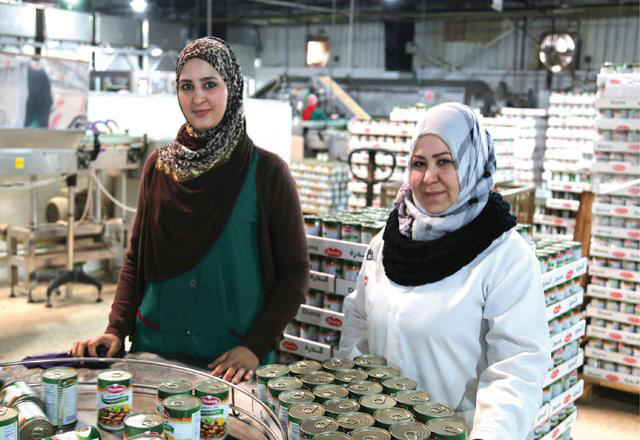AMMAN — The Jordan Labour Watch (JLW) on Thursday issued a position paper in cooperation with the Friedrich Ebert Foundation (FES) calling for “the improvement of the capacities of the Jordanian economy in order to create adequate and decent work opportunities for all new entrants”, stressing “the need to take into account the role of women in the labour market and the national economy”.
Released on the occasion of the International Women's Day, the paper pointed out the “weak” role of women in the Jordanian economy as “one of the main problems faced by the country”, stressing that “the lack of women in the labour market places additional pressure on the national economy by depriving it from the untapped potentials of female workers, especially considering that the female education rate in Jordan is higher than that of males”.
The organisation noted that there has been a “slight” progress in the economic participation rates for women, which stood at 16.2 per cent in the last quarter of 2017, while the percentage of women participating in the Social Security Corporation at the end of 2016 was 27.4 per cent.
“However, the efforts made to increase the integration of Jordanian women into the economic life are still limited,” the paper continued, adding that “the programmes created during the last period only contributed to the development of a solidarity discourse supportive of women and their various issues, instead of leading to their economic participation in a tangible and effective manner”.
“There is a need to review the various strategies aimed at enhancing the role of women in the economic life and the labour market — not only for the purpose of codifying and protecting women's rights, but also to ensure the implementation of these rights on the ground,” Director of the JLW Ahmad Awad told The Jordan Times, adding that “this requires improving the performance of the Ministry of Labour in enforcing the rights stipulated by the Jordanian legislation”.
“It is also necessary to remove the restrictions on the establishment of social forces that have an interest in law enforcement by opening the door to the formation of effective trade unions for all categories of wage earners in Jordan,” Awad added.
The JLW attributed the lack of tangible progress to the “unsettling working conditions that both men and women suffer from in Jordan”, emphasising that “women are more exposed to violations of their basic rights than men”.
“Several reports issued by the JLW prove that the majority of women working in small companies and the informal economy are subject to many violations of the provisions of the Jordanian Labour Law and the international labour standards,” the paper said, stressing that “a large number of employees works for more than 8 hours a day, receiving wages way below the minimum salary”.
The paper also highlighted “the weakness of the public transport network”, noting that “this creates more pressure on women not to engage in the labour market, in addition to the substantial number of companies that refrain from establishing nurseries for the children of their workers as stipulated by the Labour Law”.
The organisation also stressed that women with disabilities face multiple challenges in employment compared to men, with heightened difficulties in finding suitable job opportunities and exposure to harassment.
For her part, gender consultant at the International Labour Organisation Reem Aslan told The Jordan Times that “the main reason why women do not join the workforce is the gender pay gap, which can reach 36 per cent”, adding that “in many cases, their salaries do not even cover the costs of transportation to the workplace and daycare facilities for their children”.
“However, we shall not forget the steps that Jordan has taken recently in terms of flexible work arrangements and amendments to the Labour Law,” Aslan added, expressing hopes for the measures “to be reflected in an increase in women's economic participation in the ground”.
